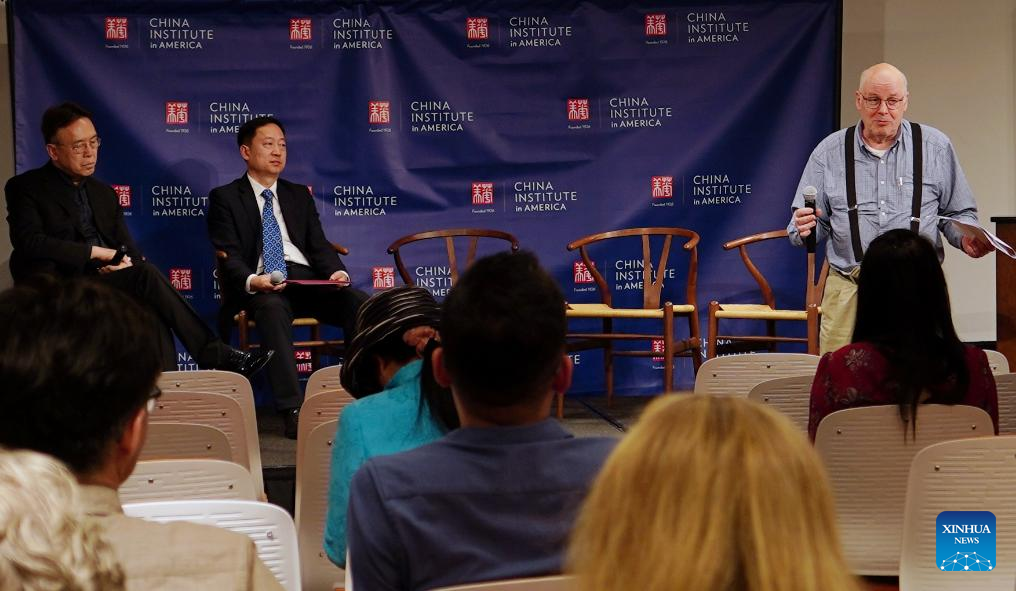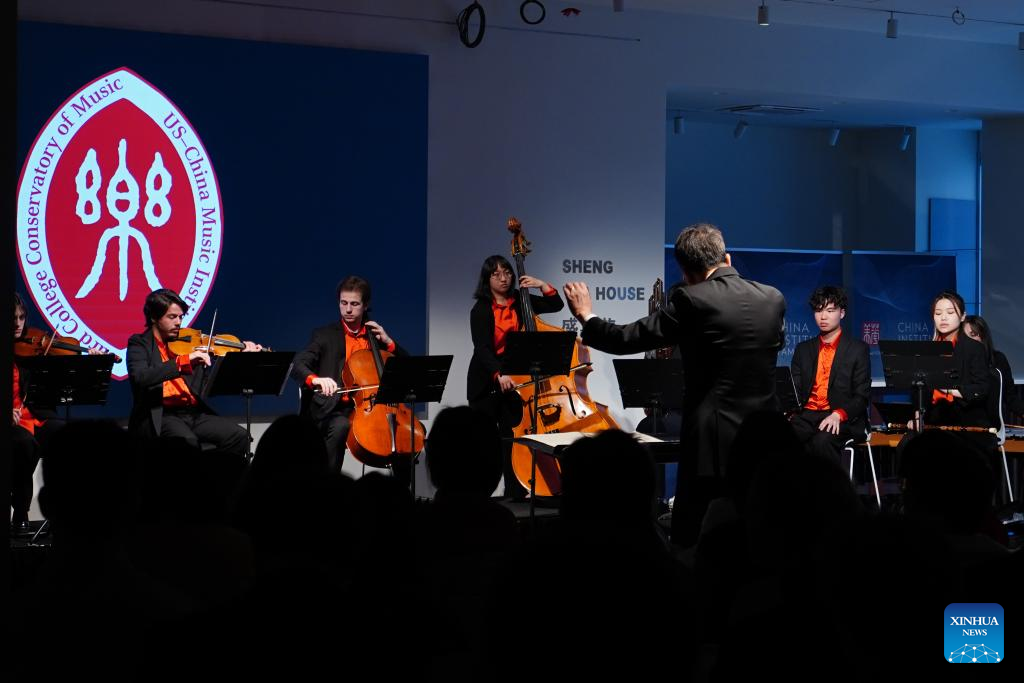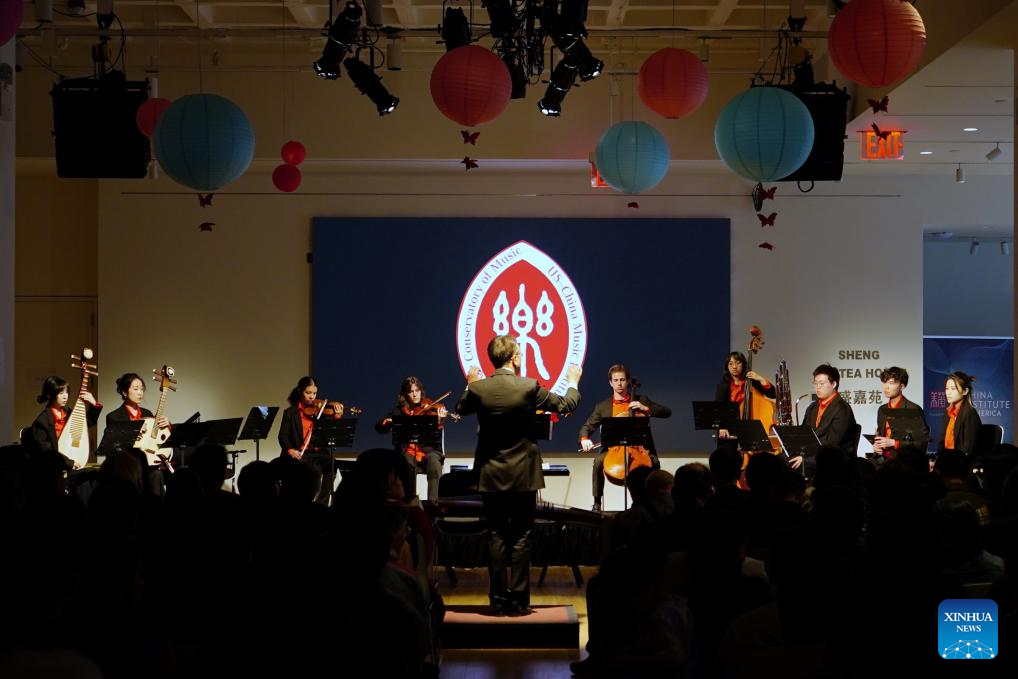Feature: Music offers pathway for U.S.-China understanding
Source: Xinhua
Editor: huaxia
2025-05-03 04:16:30

Frank Kouwenhoven (R, back), a Dutch scholar and founder of CHIME, a platform for Chinese music, speaks during the annual international conference of the U.S.-China Music Institute at the China Institute in New York, the United States, May 1, 2025. (Photo by Ada Zhang/Xinhua)
by Ada Zhang
NEW YORK, May 2 (Xinhua) -- Music continues to serve as a powerful channel for understanding between China and the United States, said scholars and musicians who gathered at the annual international conference of the U.S.-China Music Institute.
The three-day event, titled "Exploration and Resonance: Chinese Music in the West," opened on Thursday at the China Institute in New York. It was co-hosted by the institute and the Bard College Conservatory of Music. The event is part of the broader work of the U.S.-China Music Institute, which is based at Bard and has been promoting exchange between the two cultures through education and performance.
"If you look at two countries, two regions, or two cultures through a political lens, you see conflict," Jindong Cai, director of the U.S.-China Music Institute, told Xinhua. "But if you look at them through a cultural point of view, you find connection. Music, in particular, is impossible to decouple."
Cai recalled that in 1972, following then U.S. President Richard Nixon's historic visit to China, one of the first steps toward renewed engagement was an invitation for an American orchestra to perform. The Philadelphia Orchestra became the first U.S. orchestra to visit China in 1973, marking a symbolic moment in thawing relations between the two countries.
"If you look at the past 50 years, so many American orchestras, musicians, and singers have visited China. And they've seen that China produces incredible musicians and compositions."
American and Chinese musicians understand each other much better than any political situation, and they definitely want to continue collaborating, Cai said.
Sheila Melvin, a writer and scholar who spoke at the conference, said cultural exchanges between the two countries, dating back to as early as the 19th century, attracted western musicians to understand Chinese music and the community. "I just hope we can have more of" that kind of people-to-people communication, she told Xinhua.
Such exchange remains essential today, experts said. "If you have more Chinese coming to the U.S., obviously, there will be more interest in China," said Frank Kouwenhoven, a Dutch scholar and founder of CHIME, a platform for Chinese music. "If you have more Chinese students studying at an American university, then more Americans will also have some exposure to people from that corner of the Earth."
The conference also highlighted contemporary efforts to build cultural bridges. The U.S.-China Music Institute runs a program in partnership with the Central Conservatory of Music that includes four main components: a degree program for Chinese instruments at Bard Conservatory, an annual China Now Music Festival in New York, an academic conference in the spring, and a summer program for high school students from both countries.
Xiaogang Ye, dean of the School of Music at the Chinese University of Hong Kong, said Chinese music today may offer something urgently needed, which is a sense of balance and emotional clarity.
"Right now, we're seeing deep divisions across the globe. In this increasingly polarized world, perhaps Chinese music can take on a new role, not just as an artistic tradition, but as a form of emotional mediation, a means of restoring clarity and calm," said Ye, who is also a composer and president of the Chinese Musicians' Association.
Thursday's panel discussion also featured Li Zhong, vice chairman of the University Council at the Central Conservatory of Music in China, and concluded with the performances by a guqin duet and a traditional Chinese ensemble. The evening program featured a concert by the Bard East-West Ensemble. The conference will continue in the coming days with additional sessions and performances at Bard College. ■

Members of the Bard East-West Ensemble perform during the annual international conference of the U.S.-China Music Institute at the China Institute in New York, the United States, May 1, 2025. (Photo by Ada Zhang/Xinhua)

Members of the Bard East-West Ensemble perform during the annual international conference of the U.S.-China Music Institute at the China Institute in New York, the United States, May 1, 2025. (Photo by Ada Zhang/Xinhua)

Sheila Melvin, a writer and scholar, speaks during the annual international conference of the U.S.-China Music Institute at the China Institute in New York, the United States, May 1, 2025. (Photo by Ada Zhang/Xinhua)



